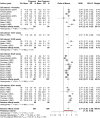Active plasma renin concentration throughout healthy and complicated pregnancy: a systematic review and meta-analysis
- PMID: 38454417
- PMCID: PMC10918957
- DOI: 10.1186/s12958-024-01200-2
Active plasma renin concentration throughout healthy and complicated pregnancy: a systematic review and meta-analysis
Abstract
Background: Pregnancy is characterized by profound circulatory changes and compensatory adjustments in the renin-angiotensin-aldosterone system (RAAS). Differences in regulatory response may antedate or accompany vascular complicated pregnancy. We performed a systematic review and meta-analysis to delineate the trajectory of active plasma renin concentration (APRC) in healthy pregnancy and compare this to complicated pregnancy.
Methods: We performed a systematic review and meta-analysis on APRC during normotensive and hypertensive pregnancies, using PubMed (NCBI) and Embase (Ovid) databases. We included only studies reporting measurements during pregnancy together with a nonpregnant reference group measurement. Risk of bias was assessed with QUIPS. Ratio of the mean (ROM) and 95% confidence intervals (CI) of APRC values between pregnant and nonpregnant women were estimated for predefined intervals of gestational age using a random-effects model. Meta-regression was used to analyze APRC over time.
Results: In total, we included 18 studies. As compared to nonpregnant, APRC significantly increased as early as the first weeks of healthy pregnancy and stayed increased throughout the whole pregnancy (ROM 2.77; 95% CI 2.26-3.39). APRC in hypertensive complicated pregnancy was not significantly different from nonpregnancy (ROM 1.32; 95% CI 0.97-1.80).
Conclusion: Healthy pregnancy is accompanied by a profound rise in APRC in the first trimester that is maintained until term. In hypertensive complicated pregnancy, this increase in APRC is not observed.
Keywords: Complicated pregnancy; Hypertension; Pregnancy; Renin; Renin-angiotensin system.
© 2024. The Author(s).
Conflict of interest statement
The authors declare no competing interests.
Figures




Similar articles
-
Blood pressure lowering efficacy of renin inhibitors for primary hypertension.Cochrane Database Syst Rev. 2017 Apr 5;4(4):CD007066. doi: 10.1002/14651858.CD007066.pub3. Cochrane Database Syst Rev. 2017. PMID: 28379619 Free PMC article.
-
Planned early delivery versus expectant management for hypertensive disorders from 34 weeks gestation to term.Cochrane Database Syst Rev. 2017 Jan 15;1(1):CD009273. doi: 10.1002/14651858.CD009273.pub2. Cochrane Database Syst Rev. 2017. PMID: 28106904 Free PMC article.
-
Physiological adaptation of maternal plasma volume during pregnancy: a systematic review and meta-analysis.Ultrasound Obstet Gynecol. 2017 Feb;49(2):177-187. doi: 10.1002/uog.17360. Ultrasound Obstet Gynecol. 2017. PMID: 28169502
-
Systematic review on urine albumin testing for early detection of diabetic complications.Health Technol Assess. 2005 Aug;9(30):iii-vi, xiii-163. doi: 10.3310/hta9300. Health Technol Assess. 2005. PMID: 16095545
-
Effect of longer-term modest salt reduction on blood pressure.Cochrane Database Syst Rev. 2013 Apr 30;2013(4):CD004937. doi: 10.1002/14651858.CD004937.pub2. Cochrane Database Syst Rev. 2013. PMID: 23633321 Free PMC article.
References
-
- Boulpaep EL. Regulation of Arterial Pressure and Cardiac Output. Medical Physiology. 3 ed: Elsevier; 2017. p. 533–55.el.
-
- Nicholson EC, Gallery EDM, Brown MA, Ross MR, Jones M. Renin activation in Normal and hypertensive human pregnancy. Clin Experiment Hyperten Part B: Hyperten Pregnancy. 1987;6(3):453–464. doi: 10.3109/10641958709023493. - DOI
Publication types
MeSH terms
Substances
LinkOut - more resources
Full Text Sources
Medical
Research Materials

